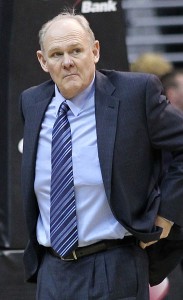Fansmanship Podcast Episode 217 – Chris Sylvester and Brint Wahlberg
It’s another podcast episode! Cal Poly basketball teams are at the Big...
In the world of sports fansmanship, when our teams experience less success than we’d like, there are a myriad of excuses we rely on in our grief. Some are more interesting than others — for example, rumors that Pau Gasol’s poor playoff performance in 2011 was caused by a scheming Vanessa Bryant instigating the breakup of his romantic relationship — but one of the oldest standbys in Fan Excuse Bingo has always been the dichotomy between big market and small market teams, the haves and have-nots of the NBA. This kind of rationalizing to justify unmet expectations only intensified prior to the current season as the team executives making roster decisions and the owners picking up the tab feared the financial ramifications of the much harsher luxury tax looming based on the new collective bargaining agreement.
There are certainly a number of factors, both tangible and perceived, that stack the deck against small market franchises with tight wallets, from the very limited revenue available from local television contracts to the undeniable allure of the big cities for top-level free agent talents looking for new homes. While success and failure in the NBA can often hinge as much on sheer dumb luck as anything else, owners and executives from the most successful small market teams have learned to rely on their own diligence and savvy decision-making to close the gap. The long-term brilliance of San Antonio Spurs general manager RC Buford and the rise of protégé Sam Presti for the Oklahoma City Thunder highlight the benefits of discipline and patience when building a successful small market franchise. Furthermore, if you can land a head coach with the ability to cultivate and get the most out of young, raw talent (Rick Adelman in Minnesota, Frank Vogel in Indiana) this can only accelerate a small market franchise’s growth.

The Nuggets have managed to lose their GM and coach in a single off-season. By Keith Allison, via Wikimedia Commons
This makes the recent developments in Denver all the more mystifying. Despite being plagued by injuries, most notably Danilo Gallinari’s season-ending torn ACL, and falling victim to Steph Curry’s awe-inspiring playoff debut in their first round series against the Golden State Warriors, the prognosis for the Nuggets was very good. Taking the helm as GM for the Denver Nuggets in 2010, Masai Ujiri earned considerable credibility around the league with his masterful handling of Carmelo Anthony’s departure in 2011. As tension grew between the disgruntled superstar, the Denver fan base, and the national media, Ujiri faced mounting pressure to take any deal from the New York Knicks or the then-New Jersey Nets that would inevitably return cents-on-the-dollar for a player widely considered Top 10 in the league. In the face of constant scrutiny, Ujiri insisted on holding out for the best possible deal, and reaped the benefits when he managed to land four valuable pieces (Gallinari, Raymond Felton, Wilson Chandler, and Timofey Mozgov) in a blockbuster trade with the Knicks. Ujiri has continued to make smart roster decisions since then; Ty Lawson remains the lone pre-Ujiri holdover on a team that overachieved their way into the third seed in the highly competitive Western Conference. For his efforts, Ujiri was voted by his peers as NBA Executive of the Year, and was promptly offered a significant raise by the Toronto Raptors, which Nuggets owner Josh Kroenke declined to match.
The overachievement of the roster Ujiri built can be heavily attributed to the work done by NBA Coach of the Year George Karl. On a team with no All-Star and no player averaging more than 16.7 points, Karl’s young squad notched a franchise-record 57 wins by consistently out-running and out-working opponents. Bolstered by the rising star of Lawson at the point, the defensive swagger of a less-burdened Andre Iguodala, and the hard-hat mentality of the Kenneth “The Manimal” Faried, the Nuggets rightfully struck fear in the hearts of most of the NBA’s top contenders, many of whom lost their season series against the Nuggets this year (including the Thunder, Grizzlies, Clippers, Warriors, and Rockets). There’s little to suggest that Karl was unsuitable to lead the Nuggets well into future seasons, and it’s not unreasonable that the reigning Coach of the Year would want an opportunity to continue developing this young, exciting team, as well as some job security with a multi-year contract extension. And yet Karl finds himself back on the market, with no shortage of interested suitors.
And this is why small market teams can’t have nice things. Big market franchises can withstand bad ownership; I’m fairly certain that we could replace Los Angeles Clippers owner Donald Sterling with Amanda Bynes on a bender and she would still manage to be less offensive and deranged than the man in charge. However, despite the odds, many of the most successful teams in recent history have shown that small market teams can keep up. They keep up by being patient, disciplined, and most of all, making smart decisions. And doing everything they could to keep the reigning Executive of the Year and Coach of the Year were the most obvious of no-brainer decisions that the Denver Nuggets still managed to mess up.
It’s another podcast episode! Cal Poly basketball teams are at the Big...
One of my favorite authors, Jeff Pearlman joins this edition of the...
Donovan Fields is one of the most joyous basketball players I’ve ever...
With the tournament more than underway and the sweet sixteen fast approaching,...
(Article by Luke “Loco” Johnson. Forgive website faux pas.) The genius of...
* Team Records accurate as of Friday morning, 8:39 A.M. The hyped hoopla...
